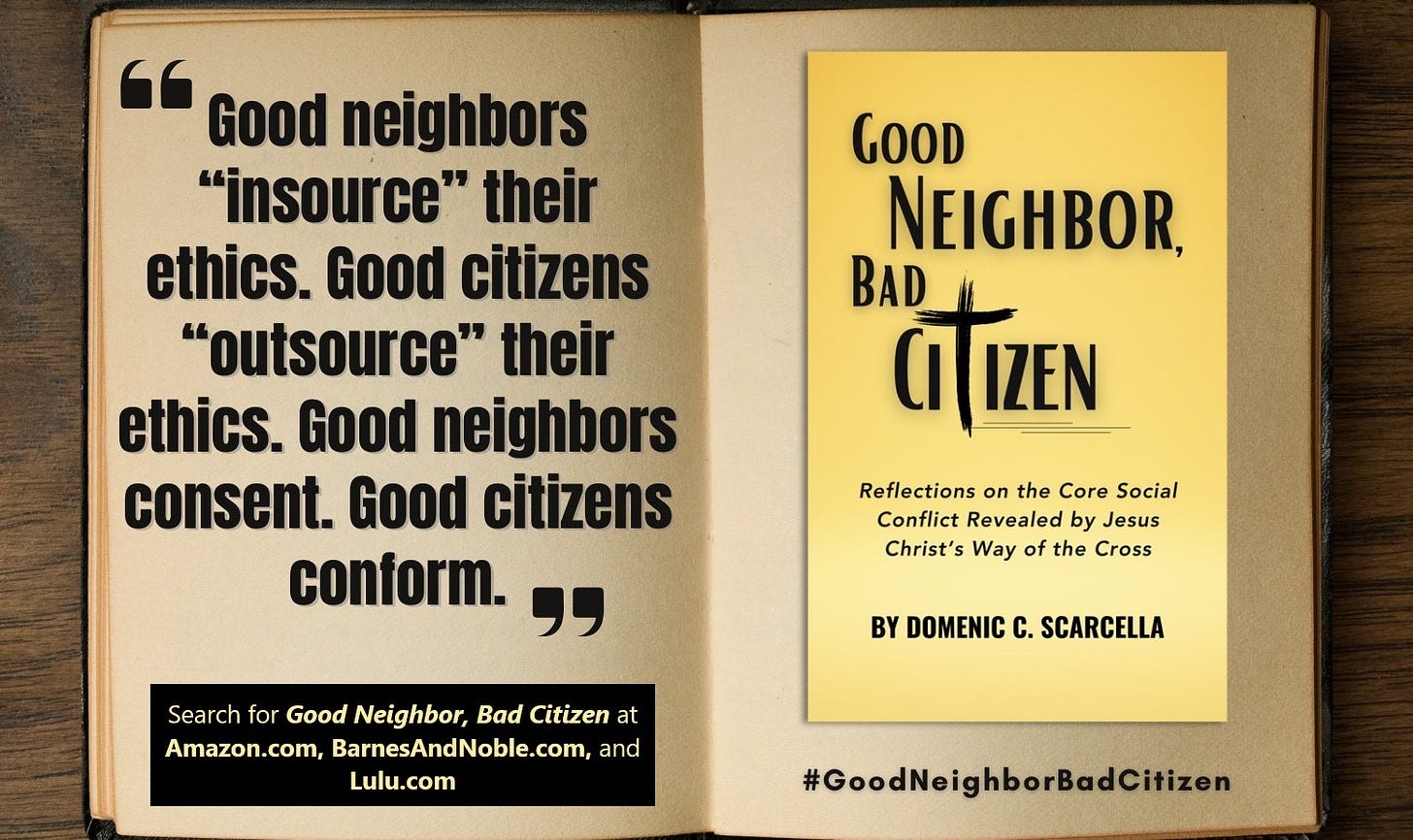Is Individualism Anti-Social?
As the COVID-19 Fascism Demonstrates, 'Good Citizen' Collectivism — Not 'Good Neighbor' Individualism — is the Truly Harmful Ideology

I wrote about figurative language last week, and showed some examples of poor metaphors for humanity that cast collectivism as good and individualism as bad. They do this by framing the former as a social mode of being and the latter as a lonely one.
But individualism isn’t isolationist.
In fact, individualism can be the foundation for healthy social interactions, while collectivism is both less humane and often tries to isolate persons (especially those who aren’t “normal”).
Let’s tackle these topics today in what will be a good sequel to last week’s discussion.
Christianity and anarchism both encourage healthy individualism
First, individualism doesn’t mean that a person lacks relationships, communities, and social boundaries.
Individualism simply means that the individual human being is the locus of human dignity and its attendant natural human rights. Groups have no dignity and natural rights apart from those brought to the group by individual members.
Society is essentially an aggregate — an abstraction — of individuals’ interactions.
And although the popularizing of the term “individualism” occurred much more recently than the writing of the Bible, the description above of individualism is supported by the Gospels.
Every instance of healing and forgiveness and miracle, begins with an individual who is willing to encounter Jesus. On the contrary, mobs of people — collectivists — who want things from Jesus are often left unsatisfied.
Perhaps the most well-known example that combines both the former and the latter phenomena is the incident, “A Woman Caught in Adultery” (John 8:3-11). It’s a beautiful and rich passage that I feature in my book, Good Neighbor, Bad Citizen.
In the book, I concentrate on what it shows about Jesus’ response to human “criminal justice” (which bears little-to-no resemblance to actual justice). And I highlight how Jesus got the mob — the group, the collective — to dissipate and refrain from its “legal” violence, and how He ultimately treated the guilty woman, too:
Jesus shows courage in appealing to the scribes and Pharisees as individual persons — as neighbors — rather than as high-status citizens. Jesus acknowledges the woman’s guilt, but He refuses to endorse the supposedly just command to inflict harm in upholding law and order.
Realizing the dignity of the individual — the good-neighbor mindset — is the best counter to the terribly deficient good-citizen orientation of outsourcing one’s ethics to the collective social order. I emphasized it in the Introduction to my book in a series of contrasts, punctuated by:
Good neighbors “insource” their ethics; charity and friendship are the key virtues of their relationships. Good citizens “outsource” their ethics; compliance with the commands of rulers and enforcers is a fundamental and necessary aspect (some might call it a “civic virtue”). Good neighbors consent. Good citizens conform.
Individualism elevates consent, and consent brings forth the most ethically sound of interactions. And consent-based, voluntary behavior also has economic benefits, as seen in the division of labor, which I wrote more about in “Division of Labor — Life Imitates Art?”
The human flourishing brought about by people pursuing their differing abilities, interests and opportunities, according to their values and risk tolerances, is personal in origin but relational in its manifestation.
Indeed, specialization is only long-term effective when people are willing to trade with each other. In the absence of social interactions, a person who specializes in a narrow area of work would leave too much undone that’s necessary for survival.
On the contrary, Collectivism is actually isolating!
Since early 2020, most of us in the Western world have lived through the fascist, anti-science tactics of the dominant COVID-19 narrative: lockdowns, stay-at-home orders, covering large portions of one’s face, and the oxymoronic “social distancing.” Ridiculous gene-therapy injections emerged in late 2020, and threats to be fired from jobs and banned from some open-to-the-public places followed in 2021; some such mandates still linger.
This top-down imposition of the most totalitarian State most of us have ever endured, resulted in extreme loneliness, anxiety and depression.
And it’s a set of harmful, inhumane tactics that people who’ve studied authoritarianism have seen before.
A recently published video from Academy of Ideas (available at their website, Rumble, YouTube, and right here on Substack) examined how the enlightenment emphasis on individuality co-evolved with a multitude of private forms of association. Sociopathic, intrusive governments have sought to diminish the meaning, support and vibrancy provided by these common-folk, consent-based relationships and private institutions.
From the video essay’s opening scenes:
[T]yrants and totalitarians in the 20th century, and into the modern day, have attempted to isolate and atomize individuals, in order to make them easier to control.
Genuine individualism doesn’t have any of this fascist nonsense; neither does genuine Christianity (and I wrote more extensively about the failures of Church leaders and congregants during the #COVIDHoax in: Is 'Spy Wednesday' — Judas Plotting To Betray Jesus — the New 'High Holy Day'?).
The evidence of the past few centuries, and especially from the most recent 100 years and the disastrous 2020-onward, is that widespread social disintegration is more likely to result from forced compliance with the overarching body politic: collectivism.

Don’t let anyone bully you into thinking that individualism must be an anti-social mode of being. The logic and evidence point elsewhere.
I welcome your individual Comments!
And I promise not to be anti-social (I’m a proper individualist, after all, heh).
What kinds of communities and private institutions do you belong to?
Has the ratcheting up of totalitarianism from the #COVIDHoax affected your relationships? In what ways have you been able to overcome these challenges?
When you hear people talk about individualism, do they equate it more with selfishness or with human dignity?
Anything else you’d like to address from this article or any of the links (including the Academy of Ideas video)?
Let me know your thoughts below …





To become an individual is to take responsibility of every act! And it requires great courage to be ready to admit our mistake and lean from any person without judging them. A lifelong quest to learn, unlearn and relearn is a must to become an individual.
"Individualism elevates consent, and consent brings forth the most ethically sound of interactions."
100%.